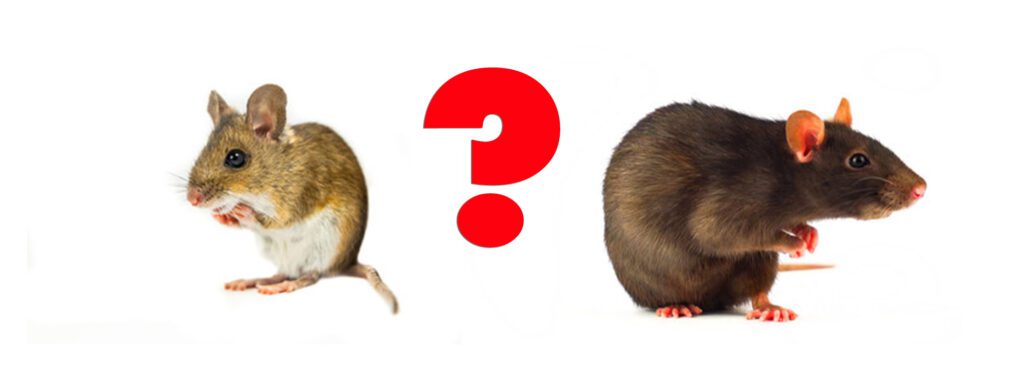Rats Vs. Mice: What’s The Difference Between Them

Our friends at Maxium Pest Control wrote an awesome article on “Rats Vs. Mice: What’s The Difference Between Them”. You can find the full article HERE.
Rats and mice are both considered rodents. Rodents are mammals that have continuously growing incisors on their upper and lower jaws. Even so, these notorious pests possess significant differences in their behavior and appearance. For instance, while mice are more curious and aggressive, rats tend to be intelligently cautious and wary of new things. Because of these behavioral differences, methods and strategies used to trap control these rodents differ significantly.
Rats Vs. Mice: What’s The Difference Between Them
At CleanStart Pest Control Services, we successfully get rid of rats and mice using highly effective and advanced tested solutions. Backed by global knowledge and over ten years of experience, our technicians will thoroughly inspect your property to determine the exact rodent species causing you trouble. We then treat your property using highly reliable and safe methods that offer a long-term solution to your pest problem.
Appearance Differences Between Rats And Mice
Rats and mice appear relatively similar, with the biggest difference being their size. Typical rats are larger and heavier than the more slender and shorter mice.
Norway rats, for instance, have thick bodies and often grow up to 7-9 inches in length. Their fur typically varies from white, brown, Gray, and black. These rodents have long tails that are usually hairless and scaly. Their ears are short and covered with dark hair, while their snouts are more blunt shape than a mouse’s. Rats produce 20-50 capsule-shaped droppings daily, and their oily fur creates grease marks that linger for long on touched surfaces.
Comparably, mice are smaller and shorter, often growing up to 5-7 inches in length, including the tail. They have a round body shape with fur that varies from white to grey and brown. Mice have large, floppy ears and tiny, black, beady eyes. Their tails are hairy and long compared to their body length. Unlike rats, mice snouts are pointed, featuring long whiskers.
Behavioural Differences Between Rats And Mice
Animals exhibit remarkable differences in their behaviour when it comes to rats and mice. Researches studies have actually revealed that the little mice brain in fact have much more knowledge than the big rats, unlike what was formerly thought.
Rats tend to be instinct-driven creatures. Although they can travel long distances to infest your home, these intelligent rodents are wary of new objects and can be repelled by them. Because of this cautious behaviour in an unfamiliar environment, rats can be quite challenging to trap. To increase your chances of catching these fearful pests, the best thing to do is to strategically place unset traps in their path before replacing them with set traps.
Even though mice are smaller and slender, they tend to be bolder and even more curious than rats. These active pests satisfy their curiosity by exploring new things in their environment, including traps. You can set bait traps directly in the mouse path to control an infestation. If mice are not trapped within the first few days, you may have set the trap in the wrong place, and it should be moved elsewhere.
Nesting And Feeding Differences Between Rats And Mice
Mice are quite skilful when it comes to nesting. Though they feed on almost anything, these small rodents strongly prefer grains, veggies, fruits, and seeds. They are excellent climbers and have been found to climb up vertical walls as long as the surfaces are rough enough to grip. Besides jumping up to 13 inches high, mice can run fast along wires and cables. These skills, plus their small size, allow mice to inhabit the higher levels of your home, including the attic, loft, and wall voids.
On the other hand, rats feed on anything they can get their claws on but often prefer meat, fish, dry pet food, and grains. Compared to mice, rats need significantly more water to survive. If they cannot extract enough water from their diets, they must find an alternative water source, such as leaks and pet dishes. Although rats can climb, they like to burrow and dig holes under buildings in order to find a place to nest.
These resourceful pests are also good swimmers and can invade a home by wriggling up the drain into the toilet bowl. You will commonly find rats inhabiting the lower levels of a building, including the basement, crawl spaces, and behind appliances.
Rats Vs. Mice: Which Causes More Damage And Health Risks?
Regarding damages, rats and mice cause similar issues for home and business owners by gnawing on surfaces, nesting in enclosed spaces, and peeing in their nesting areas.
These rodents have incredibly strong teeth, allowing them to gnaw on materials such as wood, rubber, plastic, bricks, and soft metal to gain access to your premises. In addition to causing a great deal of structural damage, rats and mice chew on electrical cables and wiring, putting your household at risk of electrical fires and electrocution. But because rats are considerably stronger and have bigger teeth, they tend to cause more damage than mice.
Both rats and mice are of significant public health importance. They create risks for you, your loved ones, and your pets by carrying and spreading fatal diseases directly via bites, urine, saliva, contact with feces, and breathing air or eating food that is contaminated. Hence, you must contact a licensed pest control company as soon as you notice or suspect rat or mouse activity.
Rats Vs. Mice: Whats the Difference Between Them and How To Prevent Them
A rodent infestation can be a serious headache for home and business owners. That’s primarily because they breed quickly, making it difficult to eradicate an infestation even in its early stages. The best way to prevent pests from entering your home is to prevent them from entering in the first place. Here are professional tips on how to prevent rats and mice:
- Limit possible food sources by placing trash in seal-able containers made of metal or hard plastic.
- Install or replace damaged door and window screens to reduce potential entry points
- Seal holes and tiny cracks in the foundation and exterior wall of your home.
- Fix any leakages, including faulty faucets and dripping pipes.
- Unclog your gutter downspout and clogged drains
- Trim back bushes and vegetation a safe distance from your home
- Store food in seal-able metal, glass, or heavy-duty plastic containers
Rats And Mice Are No Match For Maximum Pest Control Services
At CleanStart Pest Control Services, we understand the severe risks associated with a rodent infestation in homes and businesses throughout Canada. That’s why our qualified technicians thoroughly inspect your premises to determine the level and type of infestation causing you trouble. We then recommend the safest, most reliable, and most affordable pest control solution that accommodates your unique rat or mouse removal needs. Our methods guarantee a long-term solution to your rodent problem while preventing chances of re-infestations.
Contact CleanStart Pest Control Services professionals to discuss the best rodent control solution for your home or business calling now 1 (855) 297-8278.


